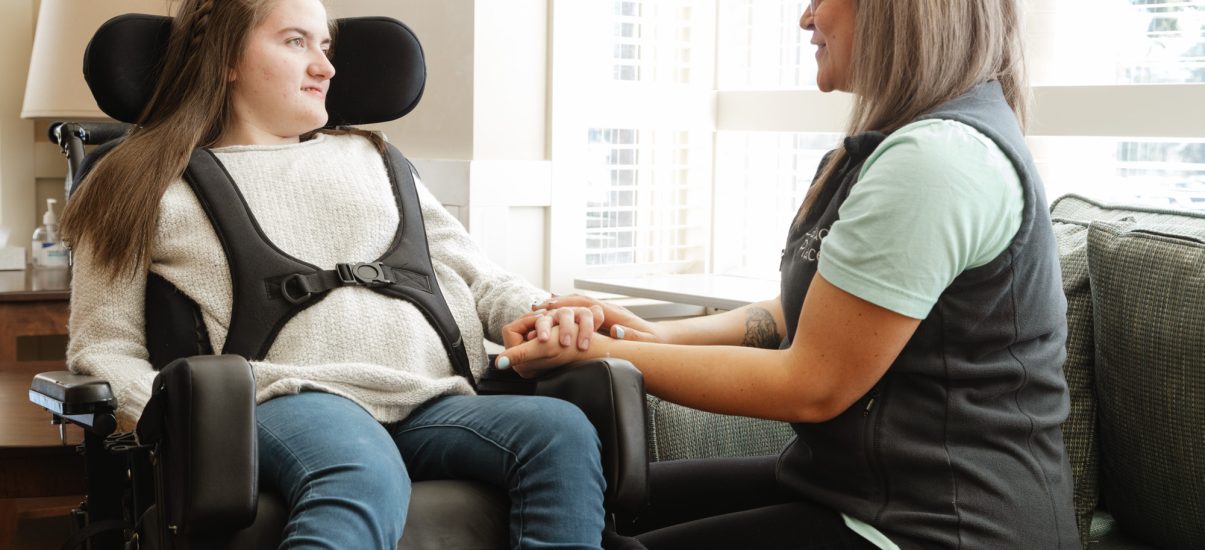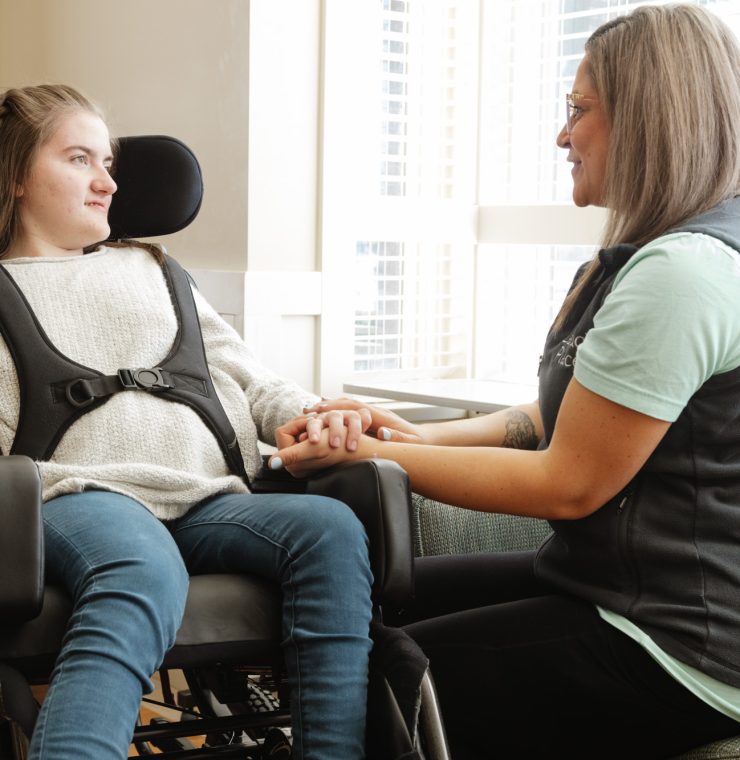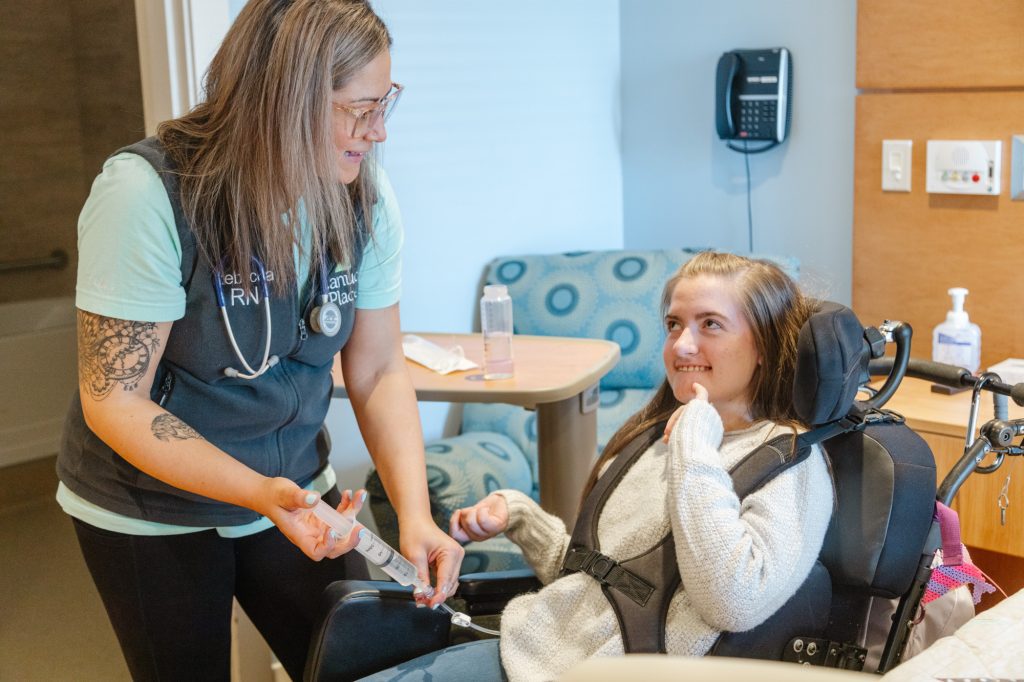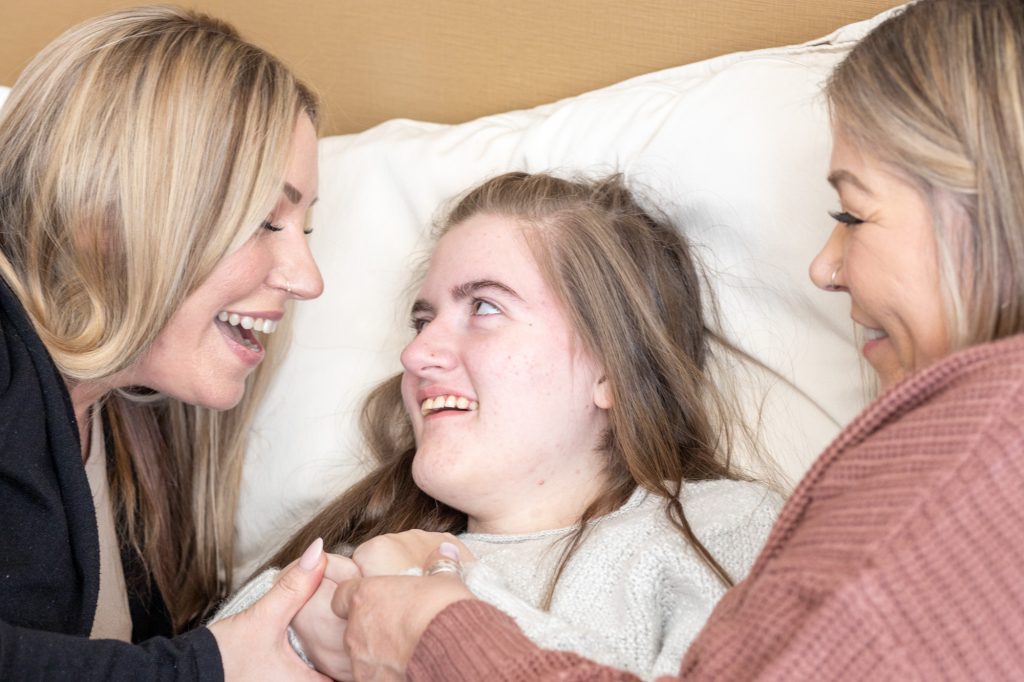

Referring a Child to Canuck Place
At Canuck Place, children are admitted to our program based on a variety of factors. Learn more below on how a clinician or health care provider can refer a child to Canuck Place.
Table of Contents
Decision Making Process
Once a week the multidisciplinary Intake team comes together at Canuck Place to review completed referrals to the program. The team includes physicians, nurse practitioners, nurses, counsellors and nurse managers across both hospice locations, as well as the Medical Director and the Clinical Program Director. The information collected is shared and discussed.
A key deciding factor for children and families accepted to the CPCH program is the presence of a progressive, life-threatening serious illness.
Definitions:
- Progression meaning that the illness/condition is actively changing/declining ongoing, affecting the health/function of the child in phases
- Life-threatening means the “child” due to their serious illness the child has an increased possibility that they may not live into full adulthood (defined as early 20’s). This is explored and considered based on what is known about the specific illness/condition and clinical experiences. The diagnosis itself does not provide the full answer, therefore each referral requires individual attention and review.
The decision making process also considers the following factors:
- Presence of a serious illness.
- A serious illness includes all children with a life-threatening/ life-limiting condition that live with a high likelihood of death before full adulthood AND negatively impacts a child’s daily function OR quality of life OR excessively stresses their caregivers. This may include other factors such as uncertainty around prognosis, a prolonged/multiple hospitalizations/ICU stays and/or where there is complex care coordination, fragility, instability, presence of complications and medical technology dependence.
- What is known about the diagnosis and the serious illness according to best evidence in the literature, expert opinion and current known disease progression. The child’s current health condition in the context of known populations in the field of Pediatric Palliative care, also known as care quadrants
- The fragility and instability of the child’s individual health course and/or health condition
- Fragility is the child’s risk of their health to worsen or their health condition to progress. For many conditions it is impossible to predict, but often predictions can be made of what is likely and not likely to improve in the future.
- Instability is the how quickly changes are occurring to a child’s well-being, which could include changes to their symptoms, function, development and care needs. Some factors considered include complications of multiple systems, severity of symptoms, symptoms specific to the child and the impact of technology and care interventions on the future.
- And the expressed needs of the referral, including the needs and known caregoals of the child and family, an openness to engage with our team.

How to Refer a Child
Canuck Place is BC and the Yukon’s only pediatric palliative care provider. Both families and health care providers can refer a child to our program. Learn about our services below and how to refer a child to Canuck Place.
Working Together for Pediatric Palliative Care in BC
Canuck Place offers pediatric palliative care for children and their families in BC and the Yukon.
Our Philosophy
The goal of our care is to enhance quality of life for both child and family when the child has a progressive life-threatening condition. We offer comprehensive, family-centered care throughout the progression of the child’s illness and until the family no longer needs our services.
Conditions Accepted for referral
We serve children ages 0-19. We also serve families in the prenatal stage whose fetus has been found to have a serious condition. The important factor for our program is the presence of a progressive, life-threatening condition. Progression meaning, on-going deterioration of health and/or functions. Life-threatening means the “child” is likely to not live into full adulthood (defined as early 20’s). They may die either because of a progressive disease process or because of disease effects and complications. Some children/youth are within slowly progressing phases of their conditions, while others are acutely terminal.
For some of the conditions we see prognosis is easier to predict, i.e. the child with cancer who is getting worse despite maximal oncological therapy. For others, e.g., metabolic diseases, prognosis is harder to predict and the literature is often misleading.
We do not need absolute evidence that this specific child will not live until adulthood. Instead we look at several factors:
- The diagnosis: what is known about the diagnosis and the condition according to the best evidence in the literature, expert opinion, and current epidemiology
- This child’s individual course: Within any given diagnosis, some children will progress faster than others
- The presence of complications: Complications may either be due to the disease itself, or to the treatment
- The readiness of the family to consider a palliative approach to care along the trajectory and enter a palliative care program
The diagnosis itself is not the full answer. There are children with multi-handicaps who are “progressing” by the nature of their condition and treatment. The child with a g-tube, j-tube, severe reflux, feeding intolerance, worsening seizures, and unrelenting episodes of aspiration pneumonia is demonstrating “progressive decline”, even though the diagnosis is static. Each case requires individual attention and review.
Family Matters
The willingness of the family to consider a palliative approach to care is important. In contrast to the older, often adult-oriented uses of the term ‘palliative’, in pediatrics we define it as the aspects of health-care addressing physical, emotional, social and spiritual comfort and quality of life. In our practice, we provide not just respite, recreation, school, etc., but a team approach to confronting the challenging issues around a child’s likely early death. We do not require a “DNR” order; but we do require the readiness to engage in thinking about the life-limiting nature of the child’s condition.

Canuck Place Referral Process
- If you believe a child is appropriate for our program, call the Intake Nurse at Canuck Place, 604-742-3476 or toll-free in BC at 1-877-882-2288 ext. 3476. Or email [email protected]. If the referral is urgent, please call the nursing station at 604-742-3475.
- We accept referrals from all members of a child’s care team (medical and non-medical), family members, friends, or self-referrals. The family should be aware of the referral.
- All of Canuck Place services are available at no cost to families
- The Intake Nurse will collect the following information about the child and family:
- Child and family/caregiver’s names
- Date of birth/Personal Healthcare Number (PHN)
- Contact details of family – address, phone number, email
- Contact details of physician/healthcare professionals involved in the child’s care
- Known care needs and current issues (if known)
- Family’s awareness of the referral (if known)
After speaking to the individual who referred, the Intake Nurse follows-up on information from the child’s physician, other care providers and possibly the child/parents to better understand the child and family needs related to pediatric palliative care and understanding of Canuck Place services and program.
This information is reviewed by the multidisciplinary Intake Team at Canuck Place who meet weekly to review completed referrals. When a decision is made the child/family will be communicated to you. To learn more about how we make decisions see decision making process.
When a child is accepted on the program, the parents/guardians/caregivers and individual who made the referral are informed, advised of the services available and further interactions with the family will be arranged to engage in program services. Canuck Place can support families and healthcare providers through a consultative, collaborative or primary role based on the care needs.
When a child and family are admitted to our program, they can access:
FAMILY SUPPORT/ MEDICAL RESPITE CARE
24 hour care of a child at the hospice, for short breaks, to give families time for rest and renewal. During this respite time Canuck Place nurses and physicians assess the child for disease progression and evaluate each child’s medication and care plan. Counselling team members provide services to the child, siblings, parents and other family members. It is also during respite visits that the care team at Canuck Place has annual family team meetings with each child’s family and/or caregivers to review how the child and family are doing on both a physical and psychosocial level. Depending on the number of children in the program, most families are offered up to 20 days of respite per year.
SYMPTOM MANAGEMENT
Active care aimed at managing the adverse physical and emotional symptoms of a child’s illness and/or side effects of treatments. Families can also call to discuss symptom management with a nurse, 24 hours a day, 7 days a week, who can then liaise with the physician on-call. It may then be determined that a symptom management admission is necessary. The length of stay is determined by the needs of the child and family and a discussion about the best location of care.
END-OF-LIFE CARE
Comprehensive services for a child and family when the child’s death is expected to be imminent. End-of-life care may occur in the hospice setting or through outreach support and services , if the family prefers the child to die at home.
COUNSELING SUPPORT AND BEREAVEMENT CARE
From the time of diagnosis, throughout their illness and after their death, Counseling support and Bereavement Care are offered for the child and their family members. Consultation and support are also made available to others involved in the child and family’s life.
CARE PLANNING AND CONSULTATIONS
Children and families do not have to come into the hospice to receive care once they are accepted to the program. Our team provides consultations with children and families and their care teams at any point along the journey. This may be a face to face meeting at a health care setting (e.g BCCH) or through telehealth videoconferencing or telephone. It is through these connections that care planning and coordination can be implemented which has been found to have many benefits.
A 24 hour 1-800 number is available to families, nurses, doctors and other care professionals from across B.C. to consult with Canuck Place doctors and nurses throughout all stages of the child’s illness.
Canuck Place’s interdisciplinary team includes:
- Physicians
- Grief counselors
- Volunteers
- Nurses
- Social workers
- Support staff
- Recreation therapists
- Chaplain
- Art, play and music therapists
- Schoolteachers
If you would like more information about our program, services, referrals, or consultations please contact the Intake Coordinator at 604-731-4847 or the Clinical Nurse Specialist at 604-742-3478 or toll-free in BC 1-877-882-2288 or e-mail [email protected]
-
Canuck Place referral forms for healthcare providers
Anyone can make a referral to Canuck Place on behalf of a child, including families and healthcare providers.
We serve children ages 0-19. We also serve families in the prenatal stage whose fetus has been found to have a serious condition. The important factor for our program is the presence of a progressive, life-threatening condition. Progression meaning, on-going deterioration of health and/or functions. Life-threatening means the “child” is likely to not live into full adulthood (defined as early 20’s). They may die either because of a progressive disease process or because of disease effects and complications. Some children/youth are within slowly progressing phases of their conditions, while others are acutely terminal.
- Standard Referral Form
- Perinatal Referral Form
- Allogenic BMT Referral Form – Starting March 2019, all children undergoing allogenic bone marrow transplants will receive a Canuck Place consultation/referral. The goal of the initial consult is:
- To introduce the Canuck Place team as an added layer of support to children with serious illness and their families
- Explore understanding of illness and goals
- Affirm decision and hopes for success of BMT
- Document baseline assessment
- Offer recommendations, if appropriate for symptom management/family support